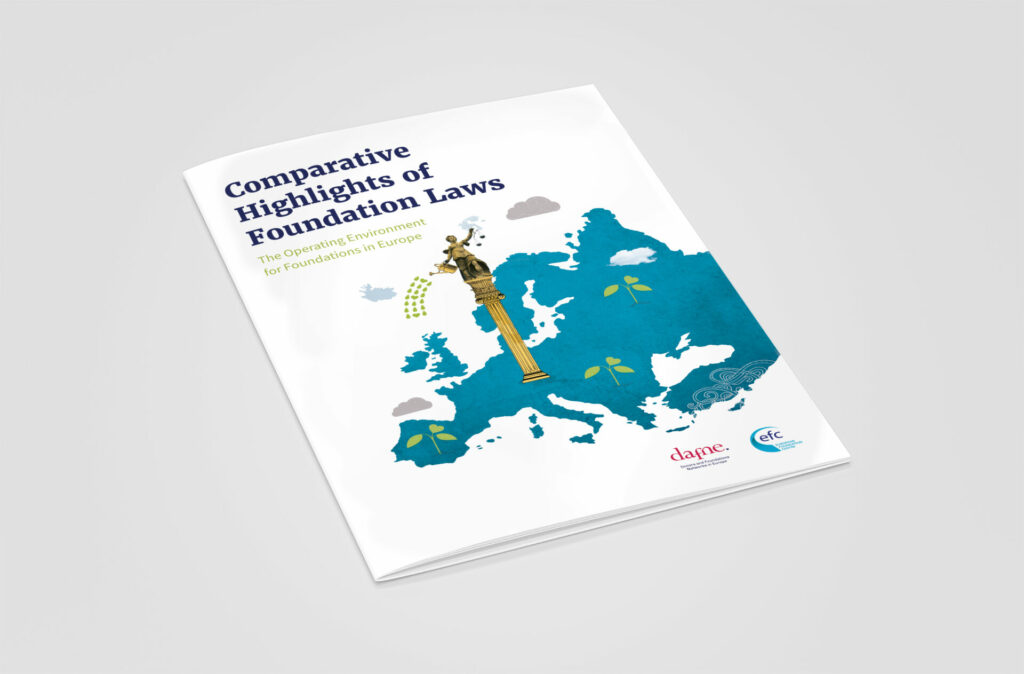STUDY: Most comprehensive overview to date of legal and fiscal regulations of foundations in Europe
Research commissioned by Dafne and EFC underscores need for a single market for philanthropy and the public good.
PRESS RELEASE
Brussels, 1 October, 2021. – Today, the Philanthropy Advocacy initiative – led by Dafne and EFC –launched the most comprehensive overview to date of the legal and fiscal regulation of foundations and philanthropy in Europe. The 2021 “Comparative Highlights of Foundation Laws” provides a broad, comparative overview of the diverse legal and fiscal environments of foundations – across 40 countries – as well as identifies relevant trends and developments.
The report looks into how philanthropy in Europe is regulated from a comparative perspective, what legal requirements exist to establish a foundation, whether foundations can pursue only public-benefit or also private purposes, what governance requirements are set out, what forms of tax incentives exist to encourage philanthropic organisations and giving and how this differs across the continent or what impact anti-money laundering and anti-terrorism legislation has on the European philanthropy sector.
“While many governments have introduced tax incentives to stimulate philanthropic activity, an enabling environment goes beyond tax incentives and includes the freedom to set up a public-benefit organisation, as well as the freedom of foundations and donors to operate without undue restrictions, either domestically or across borders,” says Hanna Surmatz, legal expert and co-lead of the Philanthropy Advocacy initiative.
The study shows that despite trends towards more integration, old and new barriers to cross-border philanthropic action exist and a European single market for philanthropy and the public good is not yet a reality.
Helmut Anheier, Senior Professor of Sociology at Hertie School and author of numerous books on philanthropy, argues in the Foreword of the publication: “More and more foundations work across national borders, and in particular their potential in the many hundreds of EU cross-border regions seems immense. In this context, there is an urgent need for a common European framework, especially in terms of cross-border tax treatment and programme activities.”
Key findings include:
- Laws are failing to keep up with the constant evolution of philanthropy’s toolbox of actions. For instance, foundations are wanting to do impact investing, offering not only grants but also loans to social businesses, and they want to do more mission-related investments. The legal frameworks, however, are not keeping pace.
- Some countries have become more flexible when it comes to requirements for foundations’ capital. Ensuring that organisations have a reliable source of income to pursue a public-benefit purpose seems to have become more important than a fixed amount of starting capital.
- Self-regulation, codes of conduct and quality labels are being discussed as effective approaches towards internal and external governance alongside state supervision. In general, authorities have no discretion in the setting up process of foundations, but discretion may exist in the interpretation of certain legal terms.
- Overregulation seems to be an issue as public-benefit foundations are being lumped together with other entities in intensifying international EU and national regulation efforts such as policies developed to fight money laundering and terrorism financing, as well as tax evasion. This has led to foundations being subject to increased reporting and due diligence requirements.
- Barriers remain for cross-border philanthropy. While it is easy for goods and services to move freely across Europe, it remains a challenge for philanthropic organisations to move their seat and for individual and corporate donors to give across borders.
The 2021 “Comparative Highlights of Foundation Laws” serves as a key reference point for philanthropic organisations, academics as well as law- and policymakers who are interested in or impacted by the regulation of philanthropy in Europe.

The report is available for download on the Philanthropy Advocacy website.
***ENDS***
Notes to the editor
The 2021 reportdraws on 40 country profiles prepared by national experts and follows the 2015 edition of this long-term mapping project. These country profiles are available for download from the Philanthropy Advocacy website.
About Philanthropy Advocacy:
The Dafne and EFC joint advocacy project Philanthropy Advocacy acts as a monitoring, legal analysis and policy engagement hub for European philanthropy. Its main objective is to shape the national, European and international legislative environment by implementing the European advocacy roadmap for a Single Market for Philanthropy. More information here: www.philanthropyadvocacy.eu.
About Dafne:
We bring together 30 national associations in 28 countries across Europe, representing over 10.000 public-benefit foundations, big and small, who want to make a difference to society. We have created an alliance for collaboration across philanthropy networks in Europe to address big philanthropy questions of our time in a coordinated and effective manner. We lead, strengthen and build the field for the common good in Europe. We are involved in four key areas: advocacy, peer exchange, communications and research that are needs-based and future-oriented. We value ideas over hierarchy and believe in a truly collaborative approach. philea.eu
About the EFC:
As a leading platform for philanthropy in Europe, the EFC works to strengthen the sector and make the case for institutional philanthropy as a formidable means of effecting change. We believe institutional philanthropy has a unique, crucial and timely role to play in meeting the critical challenges societies face. Working closely with our members, a dynamic network of strategically-minded philanthropic organisations from more than 30 countries, we:
- Foster peer-learning by surfacing the expertise and experience within the sector
- Enhance collaboration by connecting people for exchange and joint action
- Advocate for favourable policy and regulatory environments for philanthropy
- Build a solid evidence base through knowledge and intelligence
- Raise the visibility of philanthropy’s value and impact
- The EFC and Dafne jointly lead the Philanthropy Advocacy project.
Please find more information on www.efc.be.
Contact details:
Angela Pauly, Senior Communications Manager, EFC, a.pauly@efc.be, +32.495.68.74.81
Dr. Hanna Stähle, Senior Manager, EU Public Affairs and Communications, Philanthropy Advocacy, hanna.staehle@dafne-online.eu, +32.497.57.58.59
